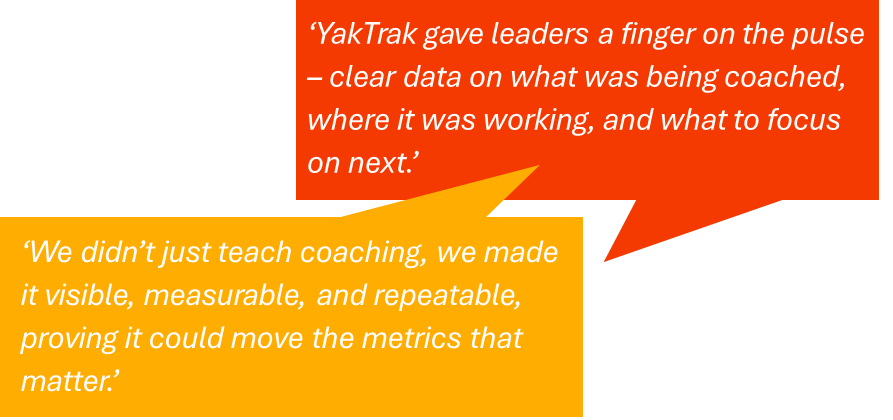Faster, smarter pathways to performance - powered by YakTrak + GRIST
The challenge: coaching without structure, leadership without confidence
An energy retailer’s regional contact centre, the opportunity was to lift performance by evolving coaching practices and improving the quality of customer conversations.
Many leaders who were still developing in their roles felt constrained by the compliance expectations of a highly regulated environment. Coaching was happening, but without consistent structure or linking to business outcomes. Senior leaders saw an opportunity to improve visibility and effectiveness.
While frontline agents took pride in their work, many found customer interactions challenging. Scripted conversations left limited room for flexibility. There was a clear opportunity to build confidence and capability in holding more natural, human conversations.
The solution: psychology meets platform
YakTrak + GRIST delivered a solution that blended behavioural science with practical coaching technology, embedding a new performance rhythm grounded in mindset, behaviour, and measurable results.
• GRIST applied its psychology of performance model to guide mindset and behaviour change - starting with high-impact, low-effort micro-behaviours.
• YakTrak provided the structure, rhythm and visibility leaders needed to build capability and sustain improvement.
To ensure the leaders weren’t overwhelmed, an express version of the ACDC coaching was introduced, focusing on seven foundational coaching behaviours. These were easy to grasp, repeatable, and designed to build early momentum.
Proving the concept: one micro-behaviour at a time
To create early belief, the program began with a single micro-behaviour: deliver a strong statement of assistance.
Example: ‘You’re in the right place, and I can definitely help you with this.’
This behaviour was selected because of its ability to improve NPS and reduced AHT by reducing customer anxiety and immediately improving the tone of the call.
Results
The results were immediate and substantial.
Some agents showed a +40 lift in NPS. AHT also dropped.
And most importantly, leaders and agents saw clear, measurable impact from one behaviour change.
From reactive to proactive: building confident leaders
YakTrak + GRIST supported leaders to take a more proactive approach - moving from a focus on output metrics to building capability through behavioural insight.
Instead of scrambling to ‘fix NPS’,” leaders could now say:
‘We know NPS is trending up because of our focus on the ‘Strong statement of assistance’ micro-behaviour. We’ll continue focusing on it for the next week and report back.’
This kind of language signaled a major shift: leaders had confidence, strategy, and a structured rhythm. YakTrak delivered the visibility to track what was being coached and whether it was sticking. They’d always known what needed to improve. Now they knew how - and they could prove it.
The platform advantage: rhythm, visibility, and trust
YakTrak enabled the coaching rhythm and embedded accountability:
•Coaching, huddles, and one-on-ones were scheduled, tracked, and visible.
•Micro-behaviour execution could be measured, discussed, and improved.
•Operating rhythm adherence gave leaders confidence and gave senior managers trust.
Why it worked: the power of GRIST + YakTrak combined
YakTrak’s reporting made it possible to correlate specific inputs – like adoption of ‘Strong statement of assistance’ – with shifts in repeat call rate & NPS.
Leaders could now link cause and effect.
The results: faster, smarter performance improvement.
Over six months (July to December), the service contact centre outcomes spoke for themselves:
Leaders who maintained consistent coaching activity and operating rhythm in YakTrak saw the strongest performance improvements highlighting the link between structured leadership practices and measurable results.
This wasn’t just a shift in performance metrics – it marked a meaningful change in how people experienced and approached their roles. Leaders moved from reactivity to confidence & control, agents began to understand what ‘good’ looked like and senior leaders saw visible alignment between their strategy and frontline behaviour
Client
Australian energy provider
Audience
250 participants
Frontline: ~230 agents
Team Leaders: ~15 leaders
Department Leaders: 2 leaders
Program
Project 2x2x2
• Focus on 2 agents
• Coach them twice a week
•Target a +2-point NPS lift
Duration
A hardship diagnostic ran in October 2023 independent from the broader program.
The primary program ran over 10 months: Feb–Mar 2024 (Engage Phase), April 2024 (Design), May–Nov 2024 (Deliver & Sustain)





